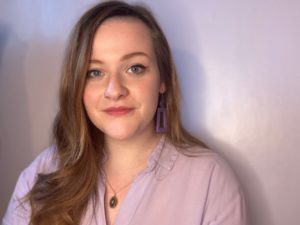HMDT Blog: Shining a light on the persecution of Yazidis
Kirsty Robson, founding member and Co-Executive Director of youth led initiative, Yet Again, describes how thousands of Yazidis in Northern Iraq were massacred, abducted or seized for slavery in 2014. She outlines the actions we can all take to shine a light on their experiences and support the Yazidi cause. Yet Again have very kindly shared their meticulously researched blog on the Yazidis with us, to help raise awareness.

Image: Yazidi refugees receiving support from the International Rescue Committee. Credit: DFID – UK Department for International Development (picture: Rachel Unkovic/International Rescue Committee), CC BY 2.0, via Wikimedia Commons.
We launched Yet Again, a youth led initiative to raise awareness of modern atrocity, on August 1st in 2020. On the day we launched, the first piece that was published was The 74th Time: The Yazidis and ISIS (Sinjar, August 2014) by Jack Nicholls:
The Yazidis are an ancient minority group indigenous to Iraq, Syria and Turkey. Numbering up to one million people, they believe that power comes from God through seven angels and their leader, Tawúsi Melek (the Peacock Angel), which has led to them being viewed by neighbouring groups as “devil worshippers” (Dakhil, V., Borda, A., Murray, A., 2017. ’Calling ISIL Atrocities Against the Yazidis by Their Rightful Name’: Do They Constitute the Crime of Genocide? Human Rights Law Review 17(2), 261-283.) They have been persecuted on many separate occasions for hundreds of years, and the assault by ISIS in the summer of 2014 would subject the group to the seventy-fourth ethnic cleansing in their history.
On 3rd August 2014 the expanding ISIS Caliphate reached the province of Sinjar in northern Iraq. Upon capturing the region, militants proceeded to target the Yazidi population. Thousands of men were massacred, and thousands more women and children were abducted. Families were separated and a mass execution of boys and men took place in a nearby school. Roughly 500 men were killed in Sinjar between 2nd and 6th August, and news of mass graves and forced abortions of Yazidi babies also made it to Western sources. Later, UN researchers calculated that 250-300 Yazidi men were executed in the village of Hardan, another 400 were killed in Kocho and between 70 and 90 men were shot in Quiniyeh. Overall up to 5,000 men were killed in a series of mass executions and another 5-7,000 women were seized for sexual slavery. But these figures have varied with one estimate put upwards of 10,800 women and children having been abducted. Whereas another gave the total number of Yazidis killed and kidnapped in early August at 9,900. These discrepancies notwithstanding, ISIS had perpetrated appalling acts of brutality on the group.
A United Nations Assistance Mission for Iraq report detailed how thousands more were forced to flee towards the mountainous district of Sinjar. An estimated 200,000 people, three-quarters of whom were Yazidi, were estimated to have escaped to the area. A few thousand were being housed in a Turkish camp in Silopi. Supplies were dropped by the Iraqi Air Force on 4th and 5th August, but they did not reach the refugees. A statement by UNICEF on 5th August suggested that 40 children had died, and another 25,000 children required urgent medical care. Hundreds died on Mount Sinjar before Syrian Kurdish forces, operating with Iraqi and American airstrikes, rescued them between 9th and 13th August, thus bringing the siege to an end.

Kirsty Robson
Yet Again seeks to amplify the voices of those who have stories to tell. We applaud the work of Yazda, the Global Yazidi Organisation, who aim to benefit the Yazidi religious and cultural community as well as other ethnic-religious minorities who have suffered from recent attacks of ISIS.
The theme for Holocaust Memorial Day 2021 is Be the light in the darkness. It encourages us all to ‘be the light’ through, for example, resistance, rescue, solidarity and shining light on mistruths.
We encourage you to shine a light on the experiences of Yazidis and show your solidarity. Here are some ways you can support them.
Read the testimony of the Yazidis (please note that they include detail that some may find difficult to read):
- The Yazidi Genocide: A Personal Perspective
- Raped, beaten and sold: Yazidi women tell of IS abuse
- Yazda: YouTube Channel
Get involved with the projects and campaigns run by Yazda:
Share what you have learnt with your family and friends, and on social media.
Kirsty Robson is a founding member of Yet Again, a youth led initiative that aims to shine a light on modern atrocity and encourages readers to engage critically with material. She serves as Co-Executive Director and Head of Outreach for Yet Again, helping provide a platform for young people to use their voice to make change.
Having been involved in Holocaust and Genocide education since she was 16, she aims to use her experiences to help others speak up. Outside of Yet Again, she is passionate about promoting Holocaust and Genocide commemoration and currently serves as the Holocaust Memorial Day Trust’s Scotland Support Worker and works in Communications for the Glasgow Jewish Community
Yet Again is a youth led initiative that aims to raise awareness of modern atrocity. Volunteer writers and researchers explore a diverse range of topics through both socio-political and legal lenses. They hope to share knowledge, insights, and passion for international justice.
You can read more about Yet Again, and get in touch, on their website www.yetagainuk.com or find them on all social media platforms at @YetAgainUK.
The HMDT blog highlights topics relevant to our work in Holocaust and genocide education and commemoration. We hear from a variety of guest contributors who provide a range of personal perspectives on issues relevant to them, including those who have experienced state-sponsored persecution and genocide. The views expressed are those of the author and do not necessarily represent the views of HMDT.


